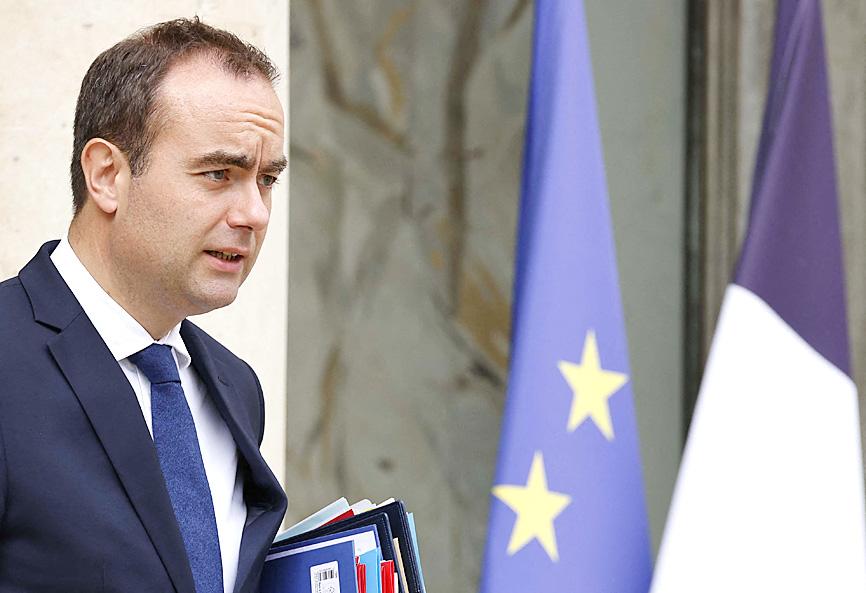French Minister of the Armed Forces Sebastien Lecornu on Wednesday appeared to rebuff China’s claims of sovereignty over the Taiwan Strait in telling the French Senate that Paris would ensure freedom of navigation in the region.
Lecornu made the remark after French Senator Olivier Cadic brought up security in the Indo-Pacific region during a question-and-answer session.
Cadic said that prior to his visit to Taipei last year with French Senator Alain Richard, who heads the Taiwan Friendship Group, 56 Chinese military aircraft had entered Taiwan’s air defense identification zone.

Photo: AFP
Taipei continues to be harassed by Beijing, which has sent 55 percent more military aircraft toward Taiwan so far this year compared with the same period last year, he said.
In addition, Chinese and Russian warships sailed past waters near Japan on July 4, he said, adding that French Navy Chief of Staff Pierre Vandier had said that China is threatening more countries around the South China Sea more frequently.
“The militarization and polarization in the Indo-Pacific region are unfortunate facts, and France should respond to them,” he said, asking the minister about how to enhance the country’s military presence in the region.
He then asked Lecornu about Taiwan issues, given that China last month claimed ownership of the Taiwan Strait as the French Senate is next week to welcome Legislative Speaker You Si-kun (游錫堃).
“Regarding the measures France takes to ensure the freedom of navigation in the Taiwan Strait, what can we tell the speaker?” he asked.
Lecornu said that France would protect that freedom.
“Diplomatically, it is France’s stance that Taiwan and China should keep communicating. Militarily, without a doubt, France would ensure the freedom of navigation protected by international laws,” he said.
He said that the patrolling missions in international waters are part of the efforts to ensure that freedom, adding that sending nuclear-powered submarines to patrol the South China Sea would “urge other countries to follow the international law of the sea.”
The Chinese Ministry of Foreign Affairs on Wednesday last week said that the Taiwan Strait was not international waters and that China has “sovereign rights and jurisdiction” over it.
The US Department of State issued a statement on Saturday last week saying that “the Taiwan Strait is an international waterway.”
Although Lecornu did not mention the Strait specifically, his statement made France the first European country to support Taiwan on the issue and reiterate the importance of the freedom of navigation.

EUROPEAN TARGETS: The planned Munich center would support TSMC’s European customers to design high-performance, energy-efficient chips, an executive said Taiwan Semiconductor Manufacturing Co (TSMC, 台積電), the world’s largest contract chipmaker, yesterday said that it plans to launch a new research-and-development (R&D) center in Munich, Germany, next quarter to assist customers with chip design. TSMC Europe president Paul de Bot made the announcement during a technology symposium in Amsterdam on Tuesday, the chipmaker said. The new Munich center would be the firm’s first chip designing center in Europe, it said. The chipmaker has set up a major R&D center at its base of operations in Hsinchu and plans to create a new one in the US to provide services for major US customers,

The Ministry of Transportation and Communications yesterday said that it would redesign the written portion of the driver’s license exam to make it more rigorous. “We hope that the exam can assess drivers’ understanding of traffic rules, particularly those who take the driver’s license test for the first time. In the past, drivers only needed to cram a book of test questions to pass the written exam,” Minister of Transportation and Communications Chen Shih-kai (陳世凱) told a news conference at the Taoyuan Motor Vehicle Office. “In the future, they would not be able to pass the test unless they study traffic regulations

GAINING STEAM: The scheme initially failed to gather much attention, with only 188 cards issued in its first year, but gained popularity amid the COVID-19 pandemic Applications for the Employment Gold Card have increased in the past few years, with the card having been issued to a total of 13,191 people from 101 countries since its introduction in 2018, the National Development Council (NDC) said yesterday. Those who have received the card have included celebrities, such as former NBA star Dwight Howard and Australian-South Korean cheerleader Dahye Lee, the NDC said. The four-in-one Employment Gold Card combines a work permit, resident visa, Alien Resident Certificate (ARC) and re-entry permit. It was first introduced in February 2018 through the Act Governing Recruitment and Employment of Foreign Professionals (外國專業人才延攬及雇用法),

‘A SURVIVAL QUESTION’: US officials have been urging the opposition KMT and TPP not to block defense spending, especially the special defense budget, an official said The US plans to ramp up weapons sales to Taiwan to a level exceeding US President Donald Trump’s first term as part of an effort to deter China as it intensifies military pressure on the nation, two US officials said on condition of anonymity. If US arms sales do accelerate, it could ease worries about the extent of Trump’s commitment to Taiwan. It would also add new friction to the tense US-China relationship. The officials said they expect US approvals for weapons sales to Taiwan over the next four years to surpass those in Trump’s first term, with one of them saying